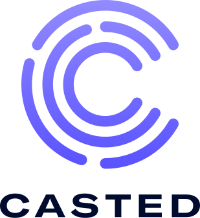If you’re a marketer, I’m willing to bet your Google searches have landed you at a HubSpot blog post at one point or another. They’re so good at producing this type of rich content that they’re largely considered the pioneers of inbound marketing content across the industry.
What you might not know is that their network of podcasts is just as good (if not better).
It all started when the (then) team at HubSpot (including our friend and recent guest Mike Volpe) needed to solve for a problem around audience. The HubSpot blog was phenomenal at attracting mid-level marketers, but how could they capture the attention of C-level decision-makers who had little time for reading lengthy articles?
“They just don’t have time to go read a blog,” says Meghan Keaney Anderson, VP of Marketing at HubSpot. “Our theory was, let’s start a podcast and see if we can catch them in those little windows of time when they’re commuting to work, working out, or trying to fall asleep.”
With that, The Growth Show was born.
Establishing the Audience
Just five years later, HubSpot now has a whole family of shows — each with its own purpose and strategy:
- The Growth Show — tailored toward VPs and C-level decision makers
- Weird Work — a mass appeal show about the strange jobs people find and pursue
- Skill Up — a search-friendly podcast for featuring how-to marketing content
- Culture Happens — HubSpot HR’s show on pursuing better corporate culture
- Agency Unfiltered — a bi-weekly webseries about scaling agencies
“Every new show we add, we hope it will teach us something,” says Meghan.
So what has she learned? A lot.
Don’t start a show just to check a box.
Starting a podcast is a big decision — and “just because everyone else is doing it” isn’t a good enough reason. If you don’t know what you’re trying to solve for with a podcast, take a step back.
“Too many brands start a podcast without knowing why,” says Meghan. “Podcasting is hard enough to grow without knowing why you’re growing it.”
If you’ve got the itch to podcast (and we totally get that!), ask yourself: “Do I want to own and produce a podcast — or just be a guest on someone else’s show?”
Guest podcasting is a completely acceptable and a viable way of still getting the word out about your brand. Plus, it’ll save you some time and energy in the long run. But sometimes producing your own podcast is the way to go.
Don’t create shows that compete with each other.
As marketers, we already compete with multiple forms of media and entertainment for peoples’ attention. If you’re going to create a network of shows, don’t cannibalize one against the other by targeting the same audience. Find a different angle like:
- Listeners in a different region
- A new show format (experiment with length, guests, style)
- Tailoring to an underrepresented group in the space
- Addressing an unsolved industry challenge
While your shows shouldn’t compete with each other, you can still use them to promote one another. For instance, HubSpot promotes Skill Up to its C-level audience on The Growth Show in hopes its listeners will recommend it to their mid-level team members. Smart!
Look for secondary uses and benefits of your content.
The best kind of content is never “one and done.” It lives on by being repurposed across mediums — and no one knows that better than a HubSpot content marketer. Meghan’s team regularly resurfaces and reuses the stories their guests tell in a number of ways, including blog posts, speeches, social media content, presentations, and even as internal lessons for their own company. Wringing all the goodness you can out of a single podcast episode just makes sense.
One of the other biggest benefits of podcasting for Meghan? The connections she’s made and stories she’s heard.
“The Growth Show has created access points to some of the most incredible business leaders and stories I’ve ever come across,” she says. “It creates this conduit for exposure to really exceptional ideas.”
Own podcasting like you mean it.
Ever heard the phrase, “you reap what you sow?” If podcasting is going to be a viable channel in your marketing mix, you have to treat it with the same attention (read: passion) you have for other big hitters like web and social. In the same way we pour over email marketing tactics and details on Google’s search algorithm, it’s advantageous for podcasters to understand the ins and outs of discoverability on the most popular listening platforms. Meghan suggests exploring:
- Differences in distribution across Spotify and iTunes
- What tactics work to top the charts
- How you will determine your show’s success (e.g. what goals you want to achieve)
Perhaps one of the best measuring sticks is your own engagement. Would you listen to what your team is producing if you didn’t own it? This can be a great gut check.
“I would listen to [The Growth Show] if I weren’t hosting it,” says Meghan. “If you make a show that you feel adds value to your own life, that’s a pretty good indication that it’s going to add value to somebody else’s.”
Is a Network Your Podcasting Destiny?
Meghan and team didn’t set out to build a network of shows — it just happened as each new challenge and subsequent theory emerged. Could the podcast network strategy work at your company, too?
Hear more from Meghan by reading the full transcript or listening to the episode.
——--
Casted is always in your corner, whether you produce one show or many. We make it easy to cater to your audience with an all-in-one platform that lets you schedule episodes, transcribe and create clips for promotion and follow-up, and capture deep analytics that help you understand your listeners better than ever. Let’s get growing!

